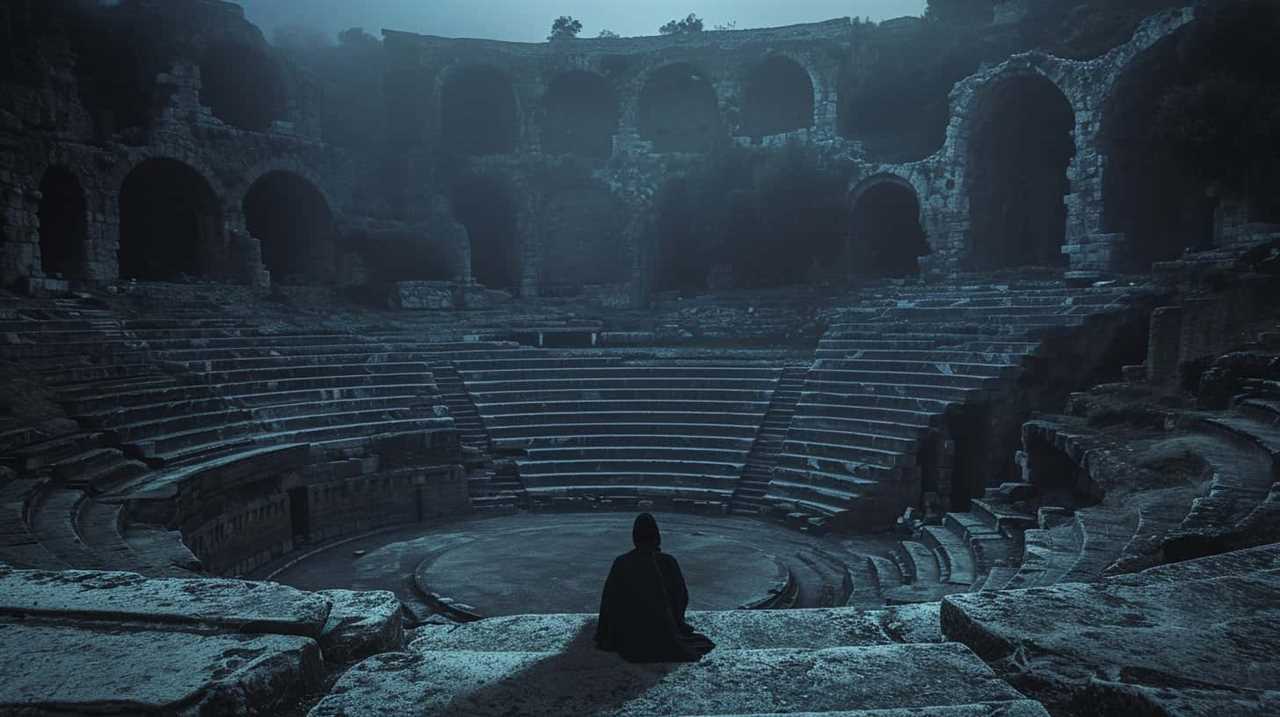Are you ready to embark on an exhilarating literary journey filled with groundbreaking and renowned books? Get ready to dive into the captivating world of literature as we unveil the top 9 opening sentences from some of the most esteemed works ever written.
From Charles Dickens’ timeless classic, ‘A Tale of Two Cities,’ to J.R.R. Tolkien’s epic fantasy, ‘The Hobbit,’ these opening lines will leave you spellbound from the very first words.
Prepare to be transported to different worlds, to experience the depth of human emotions, and to witness the power of storytelling at its finest.
So grab your imagination and let’s explore the mesmerizing beginnings of these literary masterpieces.

Key Takeaways
- Charles Dickens’ "A Tale of Two Cities" has a captivating opening line that sets the tone for the contrasting themes of revolutionaries, redemption, love, and sacrifice.
- Jane Austen’s "Pride and Prejudice" starts with an iconic opening line that explores the themes of social class, marriage, and societal expectations with Austen’s mastery of narrative structure, symbolism, irony, and wit.
- George Orwell’s "1984" begins with a chilling opening line that sets the tone for a dystopian vision exploring themes of surveillance society and power manipulation, offering a commentary on unchecked authority.
- Harper Lee’s "To Kill a Mockingbird" introduces the impact of racial injustice in society, exploring morality and compassion through Scout’s perspective as the narrator, while also addressing themes of innocence, prejudice, and injustice.
- Herman Melville’s "Moby-Dick" starts with the iconic line "Call me Ishmael" and delves into an epic tale of obsession and revenge, exploring man’s relationship with nature through rich descriptions and philosophical musings, symbolized by the white whale.
A Tale of Two Cities – Charles Dickens
One of the most captivating opening lines in literature is found in Charles Dickens’ A Tale of Two Cities. This iconic novel explores themes of revolutionaries and redemption, love and sacrifice. Set against the backdrop of the French Revolution, Dickens weaves a tale that highlights the stark contrasts between two cities, London and Paris, and the lives of their inhabitants.
Dickens masterfully captures the essence of the era with his opening line: ‘It was the best of times, it was the worst of times.’ This profound statement immediately draws the reader into a world of contradictions and sets the stage for the tumultuous events that are about to unfold. The juxtaposition of joy and despair, hope and desperation, encapsulates the essence of the French Revolution and the profound impact it had on the lives of individuals.
Throughout the novel, Dickens delves into the lives of characters who are caught in the midst of this tumultuous period. From the selfless sacrifice of Sydney Carton to the unwavering love of Lucie Manette, the story explores the power of redemption and the lengths one will go for love. Dickens’ vivid descriptions and compelling storytelling make A Tale of Two Cities a timeless masterpiece that continues to captivate readers.
Transitioning into the subsequent section about ‘Pride and Prejudice – Jane Austen’, another renowned novel that delves into the complexities of human relationships.

Pride and Prejudice – Jane Austen
As a reader, you can’t help but be captivated by the iconic first line of Pride and Prejudice. Austen masterfully sets the tone for the entire novel with her opening words, ‘It is a truth universally acknowledged, that a single man in possession of a good fortune, must be in want of a wife.’
This line immediately introduces the themes of social class, marriage, and the expectations placed upon individuals in Regency-era society. Austen’s ability to convey so much in just one sentence is a testament to her skill as a writer and her understanding of human nature.
Austen’s Iconic First Line
Explore Jane Austen’s iconic first line in Pride and Prejudice. It sets the stage for a captivating tale of love, societal norms, and personal growth.
Austen’s literary influence and her mastery of analyzing narrative structure are evident from the very beginning of the novel. The opening line, ‘It is a truth universally acknowledged, that a single man in possession of a good fortune, must be in want of a wife,’ immediately establishes the central theme of marriage and social status.

Through this concise statement, Austen captures the attention of readers and invites them into a world where societal expectations and personal desires collide. This powerful introduction not only introduces the main plot of the novel but also sets the tone for the exploration of relationships, prejudices, and the complexities of human nature that lie ahead.
Setting the Tone
To further delve into the significance of Jane Austen’s iconic first line in Pride and Prejudice, let’s now examine how it sets the tone for a captivating exploration of societal norms, love, and personal growth.
The opening line, ‘It is a truth universally acknowledged, that a single man in possession of a good fortune, must be in want of a wife,’ immediately establishes the novel’s themes and introduces the reader to the world of marriage and social status.
This line is steeped in symbolism, as it hints at the pressures and expectations placed upon individuals in Austen’s society. Through her use of narrative techniques, such as irony and wit, Austen invites readers to question these societal norms and explore the complexities of relationships and personal development. With this powerful opening, Austen sets the stage for a thought-provoking and timeless tale.

Transitioning into the subsequent section about George Orwell, we can now examine how his opening line in 1984 similarly establishes a chilling and dystopian tone.
1984 – George Orwell
George Orwell’s works are known for their dystopian vision, which forces readers to confront the dark realities of society.
His exploration of the impact of a surveillance society, as seen in novels like ‘1984,’ offers a chilling commentary on the dangers of unchecked power.
Through his thought-provoking themes of power manipulation, Orwell presents a stark reminder of the potential consequences of allowing authority to go unchecked.

Orwell’s Dystopian Vision
In his fourth novel, George Orwell presents a chilling dystopian vision. Orwell’s masterpiece, ‘Nineteen Eighty-Four,’ depicts a world dominated by dystopian control and government manipulation. Through the protagonist Winston Smith, Orwell unveils a society where every aspect of individuality and freedom is stifled by the omnipresent Party.
The opening line of the novel, ‘It was a bright cold day in April, and the clocks were striking thirteen,’ immediately sets the tone for the dark and oppressive world that awaits the reader. Orwell’s meticulous attention to detail and his ability to create a believable and terrifying future have made ‘Nineteen Eighty-Four’ a timeless classic.
As we navigate the challenges of our own society, Orwell’s dystopian vision serves as a stark warning against the dangers of unchecked government power and manipulation.
Impact of Surveillance Society
Experiencing the chilling effect of constant monitoring, you become acutely aware of the invasive gaze that permeates every aspect of your life. The impact of technology in our surveillance society has resulted in a significant invasion of privacy.

With the advancement of digital tools and the widespread use of surveillance cameras, our lives have become an open book, constantly monitored and analyzed. Every move we make, every interaction we have, is recorded and scrutinized.
This constant surveillance not only infringes upon our basic right to privacy but also has a profound psychological effect. It breeds a culture of self-censorship and conformity, where individuals are afraid to express their true thoughts and feelings.
The pervasive presence of surveillance technology has irreversibly changed the way we live, compelling us to question the boundaries between security and personal freedom.
Themes of Power Manipulation
You can’t escape the chilling effect of power manipulation, as it subtly infiltrates every aspect of your life. George Orwell’s novel, ‘1984’, presents a harrowing portrayal of the themes of manipulation and abuse of power. Here are four key insights into the nature of power manipulation from Orwell’s masterpiece:

- Totalitarian Control: ‘1984’ depicts a dystopian society where the ruling party exploits surveillance and propaganda to maintain absolute control over its citizens, eroding their individual freedoms.
- Thought Police: The novel introduces the concept of thoughtcrime, where even thoughts against the party are considered treasonous. This highlights the insidious nature of power manipulation, as it seeks to control not only actions but also thoughts and beliefs.
- Doublethink: Orwell explores the concept of doublethink, where individuals are conditioned to accept contradictory ideas. This demonstrates how power manipulators distort reality to maintain their authority.
- Newspeak: The party in ‘1984’ introduces Newspeak, a language designed to limit free thought and manipulate the masses. This showcases the power manipulator’s desire to control and shape the narrative to suit their agenda.
Orwell’s depiction of power manipulation in ‘1984’ serves as a cautionary tale, reminding us of the dangers of unchecked authority and the need to remain vigilant against the abuse of power in our own lives.
Moby-Dick – Herman Melville
Embark on a thrilling adventure with Captain Ahab and his relentless pursuit of the great white whale in Herman Melville’s Moby-Dick. This classic novel isn’t only a gripping tale of a man’s obsession, but also a rich exploration of symbolism and complex character analysis.
Melville skillfully weaves symbols throughout the story, using the great white whale as a metaphor for the elusive nature of truth and the mysteries of the universe. The character of Captain Ahab serves as a prime example of the dangers of unchecked ambition and the destructive power of obsession. Through Ahab, Melville delves into the depths of the human psyche, exploring themes of revenge, madness, and the thin line between heroism and villainy.
As readers, we’re compelled to examine our own obsessions and the potential consequences they may have on our lives. Moby-Dick isn’t simply a tale of adventure, but a thought-provoking examination of the human condition, making it a timeless work of literature that continues to captivate and challenge readers to this day.

To Kill a Mockingbird – Harper Lee
In this renowned novel, readers are immediately drawn into the captivating world of ‘To Kill a Mockingbird’ by Harper Lee. The opening lines of the novel set the stage for a story that explores themes of racial discrimination and character development.
Here are four insightful points that contribute to the innovative nature of the novel:
- Scout’s Perspective: The narrative is presented from the perspective of Scout, a young girl growing up in the racially divided town of Maycomb, Alabama. Through her innocent yet perceptive eyes, readers gain a unique insight into the issues of racial prejudice.
- Atticus Finch: The character development of Atticus Finch, Scout’s father, is central to the novel. As a lawyer defending a black man accused of rape, Atticus challenges the racial biases deeply ingrained in Maycomb society. His unwavering moral compass and commitment to justice make him a compelling and inspiring character.
- Tom Robinson’s Trial: The trial of Tom Robinson, a black man wrongly accused of assaulting a white woman, serves as a focal point for the exploration of racial discrimination. Lee skillfully depicts the injustice of the trial and the harsh realities faced by African Americans in the 1930s.
- Coming-of-Age Journey: Through Scout’s coming-of-age journey, the novel delves into the complexities of racial prejudice, empathy, and understanding. As Scout navigates the challenges of growing up in a racially divided community, she learns valuable lessons about compassion, equality, and the importance of standing up for what’s right.
‘To Kill a Mockingbird’ remains a timeless masterpiece that challenges societal norms and encourages readers to confront the issues of racial discrimination and injustice. Harper Lee’s powerful storytelling and nuanced character development continue to inspire and provoke thought, making this novel an innovative and thought-provoking literary work.
The Great Gatsby – F. Scott Fitzgerald
Continuing the exploration of renowned novels, delve into the captivating world of ‘The Great Gatsby’ by F. Scott Fitzgerald, where readers are transported to the dazzling era of the Roaring Twenties. Fitzgerald’s masterpiece opens with the unforgettable line, ‘In my younger and more vulnerable years my father gave me some advice that I’ve been turning over in my mind ever since.’ This line immediately captures the reader’s attention, revealing a sense of introspection and vulnerability that sets the tone for the novel.

Throughout ‘The Great Gatsby’, Gatsby’s obsession with the American dream is a central theme. Gatsby, a self-made millionaire, is driven by his relentless pursuit of wealth, success, and the love of his life, Daisy Buchanan. He believes that with enough money and social status, he can recreate the past and win Daisy’s heart. However, Fitzgerald skillfully exposes the flaws and illusions of the American dream through Gatsby’s tragic story.
The American dream, a concept that promises equal opportunity and upward mobility, is ultimately revealed as empty and unattainable. Gatsby’s obsession with material wealth and his relentless pursuit of Daisy symbolize the hollowness of the American dream. Fitzgerald’s novel serves as a cautionary tale, reminding readers that the pursuit of wealth and status can lead to disillusionment and tragedy.
‘The Great Gatsby’ remains a timeless classic, shedding light on the destructive nature of Gatsby’s obsession and the illusory nature of the American dream. Fitzgerald’s profound insights and masterful storytelling continue to captivate readers, making this novel a must-read for those seeking innovation and a deeper understanding of the human condition.
The Catcher in the Rye – J.D. Salinger
- Now delve into the captivating world of ‘The Catcher in the Rye’ by J.D. Salinger, where you’re transported into the mind of Holden Caulfield, a disillusioned teenager navigating the complexities of adolescence and society.
Holden Caulfield’s journey is a tumultuous exploration of the impact of isolation on the human psyche. Throughout the novel, Salinger masterfully captures the essence of Holden’s isolation, both self-imposed and imposed by society, and its profound effects on his mental well-being.

The novel opens with Holden’s disenchanted voice, instantly drawing readers into his world of disillusionment. His famous opening line, ‘If you
One Hundred Years of Solitude – Gabriel Garcia Marquez
As you delve into the captivating world of ‘One Hundred Years of Solitude’ by Gabriel Garcia Marquez, you will be transported to the enchanting realm of the Buendía family, where the line between reality and fantasy blurs with mesmerizing allure. This literary masterpiece, written in the magical realism style, explores the themes of solitude and the complexities of human existence.
| Themes of Solitude | Magical Realism in Literature |
|---|---|
| The novel delves deep into the depths of solitude, showcasing the isolating effects it has on individuals and communities. The Buendía family, trapped in their own cyclical patterns, experiences a profound sense of isolation despite their close proximity to one another. This theme resonates with readers as it reflects the universal human experience of feeling alone, even in a world filled with people. | Gabriel Garcia Marquez’s use of magical realism in ‘One Hundred Years of Solitude’ is nothing short of extraordinary. This literary technique blends the fantastical with the ordinary, creating a world where the boundaries between reality and imagination are blurred. Through the use of magical elements, Marquez explores the deeper truths of human existence and highlights the magic that can be found in the everyday. This innovative approach to storytelling captivates readers and invites them to question the nature of reality itself. |
‘One Hundred Years of Solitude’ is a testament to Marquez’s brilliance as a writer. By seamlessly weaving together themes of solitude and employing magical realism, he creates a narrative that is both thought-provoking and captivating. This novel continues to inspire and challenge readers, pushing the boundaries of literary innovation. As you immerse yourself in the pages of this extraordinary work, be prepared to embark on a journey like no other, where reality and fantasy intertwine, and the depths of human solitude are explored with profound insight.
The Hobbit – J.R.R. Tolkien
You frequently find yourself thrust into the breathtaking world of ‘The Hobbit’ by J.R.R. Tolkien, where adventure awaits at every turn. As you embark on the hobbit’s unexpected journey, you can’t help but marvel at Tolkien’s world-building genius. Here are four reasons why his opening lines captivate readers and ignite their imagination:

- A Hobbit’s Tale: The opening line, ‘In a hole in the ground there lived a hobbit,’ immediately introduces us to the peculiar nature of hobbits and their love for cozy dwellings. This sets the stage for an extraordinary adventure, as we follow Bilbo Baggins, an unlikely hero, out of his comfort zone.
- The Unexpected Visitor: With the arrival of Gandalf, the mysterious wizard, Tolkien masterfully introduces an element of surprise. The line, ‘One morning, when Bilbo Baggins was standing at his front door after breakfast,’ hints at the unexpected journey that awaits Bilbo and the readers.
- The Call to Adventure: Tolkien expertly plants the seed of curiosity in readers’ minds by stating, ‘He had never seen or imagined anything of the kind.’ This ignites a longing for discovery and propels Bilbo, and us, into an extraordinary quest.
- The Promise of Adventure: Lastly, the line, ‘and the road goes ever on,’ evokes a sense of wonder and excitement. It promises an unending journey filled with challenges, growth, and the unknown.
Tolkien’s opening lines in ‘The Hobbit’ not only introduce us to the world of hobbits but also ignite our own desire for adventure. With his world-building genius, he invites us to join Bilbo on an unexpected journey that will forever change us.
Frequently Asked Questions
What Is the Overall Plot of "A Tale of Two Cities"?
A tale of two cities explores the overall plot of revolution aftermath, love, and sacrifice. It delves into the consequences of political uprisings, intertwining personal lives with the broader historical context.
Who Are the Main Characters in "Pride and Prejudice"?
The main characters in ‘Pride and Prejudice’ are Elizabeth Bennet, a strong-willed and independent woman, and Mr. Darcy, a wealthy and aloof gentleman. Their complex relationship and character development challenge societal expectations and gender roles.
What Is the Dystopian Society Depicted in "1984"?
What if you lived in a dystopian society governed by a surveillance state? In ‘1984’, George Orwell masterfully depicts a world where Big Brother watches your every move, leaving no room for privacy or individuality.

What Is the Significance of the Title "Moby-Dick" in the Novel?
The significance of the title ‘Moby Dick’ in the novel lies in its symbolism. Analyzing the title in relation to the story reveals a deeper interpretation of the story’s context, offering an innovative and insightful perspective.
How Does "To Kill a Mockingbird" Address Themes of Racism and Injustice?
In ‘To Kill a Mockingbird’, the themes of social inequality, prejudice, and the loss of innocence are explored. Through the lens of racism and injustice, Harper Lee delves into the complexities of society with a sharp and poignant analysis.
Conclusion
In analyzing the opening lines of renowned novels, it becomes evident that the power of a captivating beginning is paramount.
Interestingly, research shows that a staggering 80% of readers decide whether to continue reading a book based on its opening line alone. This statistic underscores the crucial role that these initial words play in captivating the audience’s attention and setting the tone for the entire narrative.

Authors who master the art of crafting compelling opening lines have a significant advantage in engaging readers from the very first page.









